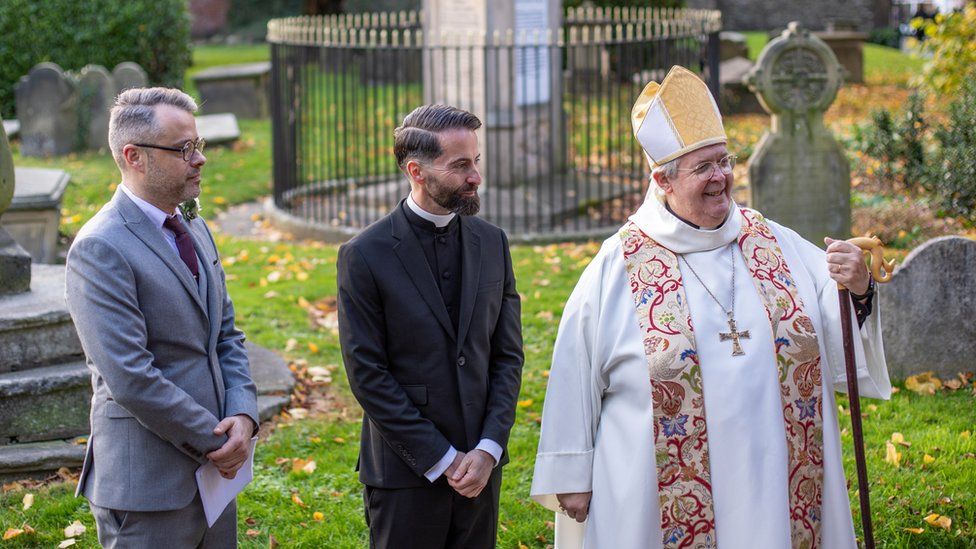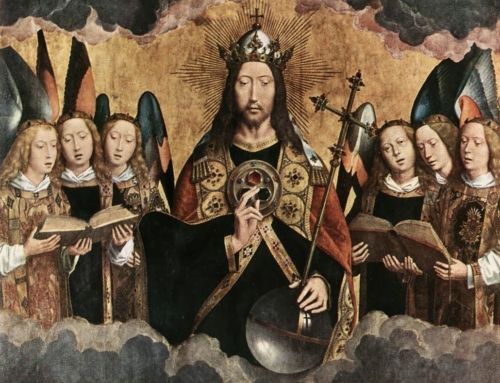Now having had a chance to read Fiducia Supplicans– the new document from the Vatican on blessings, I have a few thoughts from the point of view of a parish priest.
As usual, I advise readers to avoid jumping to conclusions by reading (and believing) headlines, social media posts and scare quotes. Here is the document itself. If you are concerned read it. Here is the comment on the document from the US bishops conference. Also, as usual, I encourage Catholic readers to read the document with an open mind and heart–not pre-judging or condemning or condoning something based only on one’s emotions and presuppositions.
But first, to the various responses to this document: Rod Dreher has written a long blog post here about it in his usual dramatic style. I like Rod and he is a personal friend, but it is worth remembering that he has a hefty readership of conservative Christians and he is good at throwing red meat to his hungry audience. His blog post is most interesting where he references the West’s submission to the ancient demon gods of Mesopotamia: Tammuz, Ishtar and Molech. I’m not sure I agree with the more extreme aspect of his warnings, but he is a good prophetic voice and his blog (and sub stack) always make for juicy reading.
He, along with Eric Sammons at Crisis magazine and other conservative voices have expressed dismay about Fiducia Supplicans–some in apocalyptic “we must resist!” language. Meanwhile Fr James Martin SJ and other activists for the LGBTQ ideology–along with the mainstream secular media–have proclaimed a great victory. Claiming that “Vatican blesses gay unions” and the predictable half truths and misrepresentations. So what do we make of this document and how does it affect ordinary Catholic parish life on the ground?
First of all, the document affirms the traditional teaching on marriage and the impossibility of homosexual “marriage”. It also stipulates that if homosexual couples are blessed, the blessing is not to be liturgical in any way so as not to cause confusion and give the impression that this is a marriage. It also goes on rather tediously to explain how it may be a good thing for individuals who are sinners to pray for God’s blessing, guidance, support and strength to do the right thing. Yes. OK. Thanks for that, but as one commentator has rightly pointed out, “It has always been ok for priests to bless people and ask God to help them do the right thing. Why did we need a great long document telling us that this was also okay for homosexual couples and others in “irregular” relationships?” The reason, this commenter opined, was because the authorities wanted to explicitly and purposefully promote and validate homosexual relationships while not appearing to do so.
Of course we may ask God to guide and help of all sorts of sinners, but that is not what the LGBTQ activists actually want. When they say they “want the church’s blessing” they mean “we want the Catholic Church to condone our activities and ideology”. They are using the language in the popular understanding meaning “They have given me their blessing” which means “They have approved of my course of action.” Predictably, the mainstream media headline writers have also taken this popular understanding of “You have my blessing.”
This comes from a popular mis-understanding of what a priestly (or diaconal) blessing actually IS. The meaning of blessings has been degraded to mean no more than a bland tolerance or kindly acquiescence. So it is worth asking what a blessing actually is. What happens when I, as a priest, am ask to bless someone or something?–and this happens on a regular and frequent basis.
Catholics love blessings. So after Mass a child trots up and says, “Can I have a special birthday blessing Father?” an older couple wait patiently and say, “It’s our fiftieth anniversary can we have a special blessing?” or the long stream of folks wanting devotional objects, sacramentals and images blessed. All of this plus whenever there’s food going Father has to “give the blessing”. In addition folks want just about anything blessed: bless the house. Bless the new car. Bless the pets on St Francis’ Day. Bless me when I sneeze. Bless me when I don’t sneeze. You get my point. Father is a fount of blessings.
Catholics love blessings because we understand reality through the “sacramental vision”. We believe God actually pours his grace and goodness into the world through physical things: primarily through the incarnation of his Son who takes flesh of the Blessed Virgin Mary, but by extension through his mystical body the Church–which is the sacrament of salvation, and by the church through the sacraments and, by further extension through the sacramentals and ultimately, and possibly although in a diffused way, through the “sacrament of creation” in other words all created things.
The authors of Fiducia Supplicans go to some effort to provide a theology of blessings, explaining from Scripture how a blessing may be one of “descent” in which we invoke God’s blessing on some person or thing. Then there is a blessing of “ascent” in which our praises ascend to God in worship. The blessings we are concerned with here are more those of “descent” and the document makes clear that by asking for such a blessing the person is (theoretically at least) submitting themselves to God’s perfect will.
Therefore when a priest or deacon pronounces God’s blessing he is, by virtue of his ordination, praying for God’s goodness, truth and beauty to be poured out on and in and through that physical person or object. This is what a blessing is. We believe it is not simply a prayer for God’s guidance and support and warm feelings, and this is where I take issue specifically with Fiducia Supplicans: it talks about “expanding” the pastoral aspect of blessings, but in fact weakens the understanding of blessings. It seems to indicate that a blessing is no more than a prayer for God to help, guide and support a person.
This same weakness is evident in the official post Vatican 2 Book of Blessings. There are words for blessing all sorts of things in the Book of Blessings, but in fact the prayers are not really blessings at all. They are almost all simply prayers for God to help and support the people using those things.
So first of all, in analyzing the text from the Vatican we should be clear about what a blessing is and is not. By all means offer prayers for support and guidance to sinners and follow up on your good words of support and guidance by supporting and guiding them to the confessional. However, if you are a priest or deacon and you are giving a blessing, then it should be a formal, liturgical blessing by which you, through your apostolic power, impart God’s blessing on that person or object. To say a blessing should not be liturgical cheapens the blessing to not much more than a cheerful wave and greeting, “God Bless You!” a comment after someone sneezes or a condescending remark from a Southerner… ” Bless her heart….Aww, Bless.”
To be clear what I mean by blessing I should compare it to a curse. If you curse someone or something, by your willful subjection of that thing or person to Satan you consecrate that person or thing for damnation. Those who work in the ministry of deliverance will testify to the fact that curses and maledictions DO something. They put that person under a cloud of spiritual malevolence. The object cursed for use in occult ceremonies can carry evil into a person’s life. That’s why when a person is delivered from occult bondage they must burn their tarot cards, ouija boards, occult books and all other paraphernalia associated with the dark side.
A blessing is the opposite of a curse. It is a real invocation of God’s power, protection, providence and prosperity for that person. It is a little exorcism if you like–consecrating that person, that object, that food, that drink for the goodness, light, life and love of God. To bless a person in this respect it would be most appropriate to do so after they have been to confession and received absolution. This is comparable to the blessing a priest gives at the end of Mass. At that point the people have been forgiven and made their communion so they are in a state of grace to actually receive God’s blessing most abundantly.
This is what a blessing is. It is not just praying for God to help someone. It is not a pat on the head saying, “I like you. I think you’re grand and God does too.!” It is not simply a smile and a nod approving a person’s lifestyle because you want to be kind. If people think that is what a blessing is, they’ve got it mixed up with a greeting card.
So to conclude, how does Fiducia Supplicans play out in parish life? It means I will continue doing what I already do: doing my best to rise above my naturally grumpy nature to welcome all who are seeking the Lord–to encourage and support them no matter what their condition in life and to help them find the Lord’s forgiveness, healing and love. When asked to bless people and things I will invoke God’s blessing on them with faith, hope and love. If I am aware that they are alienated from the Lord I will try to be a good pastor and lead them to a state of grace. I will also be aware of the present culture wars–realizing that the best way to battle against all forms of decadence and despair is to build up a joyful, faithful Catholic parish and school community–to prepare young people for marriage as best we can, to support our marriages and families, to nurture our children together and to thereby show by our actions and life together what God’s plan is for the human family. When we encounter those who are tempted to indulge in sin of any kind I will seek to listen to their struggles, counsel them in the ways of virtue and offer absolution when they stumble and fall.
In that sense, at the parish level, it’s business as usual. However, I can see that Fiducia Supplicans will have other effects in other places. Firstly, although the document states, “From a strictly liturgical point of view, a blessing requires that what is blessed be conformed to God’s will, as expressed in the teachings of the Church” it is unavoidable to conclude that the blessing of “a couple in an irregular relationship” implies approval of that relationship. Also, The document says that blessings of same sex couples should not be liturgical or cause confusion with marriage ceremonies. From my experience in the Anglican Church, this is a piece of naivety on a monumental level. To be fair paragraph 39 states,
In any case, precisely to avoid any form of confusion or scandal, when the prayer of blessing is requested by a couple in an irregular situation, even though it is expressed outside the rites prescribed by the liturgical books, this blessing should never be imparted in concurrence with the ceremonies of a civil union, and not even in connection with them. Nor can it be performed with any clothing, gestures, or words that are proper to a wedding. The same applies when the blessing is requested by a same-sex couple.
But here is what will happen: Gary and Larry will plan a “non liturgical blessing”. The non liturgical rule opens the way for them to plan their own “blessing event” on the beach or at a posh hotel. They will invite a friendly priest and since it is “non liturgical” the priest will be free to make up his own form or words or the couple can write their own vows. Guests will be invited. There will be flowers, “groomsmen” or “bridesmaids” fancy clothes, music, candles and all the trimmings. But “It isn’t a wedding!”
Will the priest demur in obedience to paragraph 39? How would he do so? Will he be involved in the planning and say “Sorry guys. In my opinion this is too much like a wedding. Come in more casual clothes, can the flowers and the music and the fancy food and the guest list and the swanky hotel.” But (and this is more likely) he is not involved in planning because it’s just an informal event right? But he turns up at the location and finds everybody there and waiting with all the bells and whistles. What does he do? Walk out? Tell them all to go home? I doubt it.
To put it briefly, the intentional ambiguity of Fiducia Supplicans opens the door to just about every subversion of marriage demanded by the enemies of the faith, but that same ambiguity means the document is toothless.







Would be nice if the Vatican and/or this Pope could do something that wasn’t a total disaster for the faithful. Will there be correction for priest like James Martin when they bless same sex marriages in Church? I doubt it.
Thank you for your very well thought out comment. From my lay person’s point of view, it seems obvious that any individual can ask for a blessing to help him/her be closer to God–which includes fighting any propensity to sin. But blessing homosexual couples as such is a literal scandal. There’s plenty of “weasel room” in the document for a priest on his own to either “go along to get along” or respectfully decline. But as you and the Protestant quoted by Dreher imply, why write a document about it, if not to give a yellow light to perversity? And what if bishops order their priests to take the sin-colluding view? Oh, dear!
I’ve heard thoughtful priests disparage the Book of Blessings before. Now I understand its problems better. Your (accurate) contrasting of blessings to curses makes it clear that we have been diluting the meanings of our salvific instruments far too much in recent years.